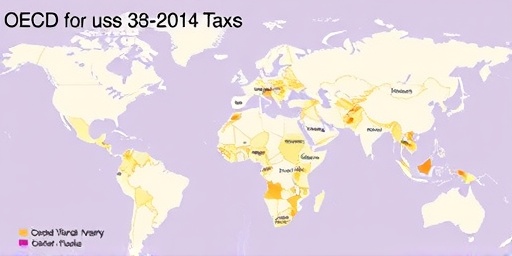In a landmark announcement that signals a major shift in international fiscal landscapes, the Organisation for Economic Co-operation and Development (OECD) has revealed that more than 300 preferential tax regimes across the globe have been either amended or completely abolished. This sweeping reform, part of the OECD‘s ongoing Base Erosion and Profit Shifting (BEPS) initiative, aims to dismantle harmful tax practices that have long allowed multinational corporations to exploit loopholes and evade fair contributions to global taxation systems.
- OECD’s BEPS Initiative Drives Global Tax Regime Reforms
- Key Jurisdictions Step Up: Reforms in Asia, Europe, and Beyond
- Multinational Corporations Face New Realities in Tax Planning
- Challenges and Criticisms in Implementing Global Tax Reforms
- Looking Ahead: Sustained Momentum in International Tax Cooperation
The changes, detailed in the OECD‘s latest progress report released on [insert date, e.g., October 15, 2023], come as nations worldwide intensify efforts to align their economic policies with international standards. These reforms are projected to generate billions in additional tax revenues, potentially reshaping cross-border economic activity and pressuring multinational corporations to rethink their strategies. With over 140 countries participating in the Inclusive Framework on BEPS, the scale of this transformation underscores a collective commitment to curbing tax avoidance.
OECD’s BEPS Initiative Drives Global Tax Regime Reforms
The OECD’s BEPS project, launched in 2013, has been the cornerstone of these efforts to combat tax avoidance by multinational corporations. At its core, the initiative targets structures that erode tax bases and shift profits to low-tax jurisdictions. The recent report highlights how jurisdictions have responded to peer reviews and commitments under the BEPS Action Plan, particularly Actions 5 and 6, which focus on harmful tax regimes and treaty abuse.
According to the OECD, the 300-plus regimes reformed include everything from patent boxes and headquarters incentives to special economic zones that previously offered undue tax benefits. For instance, in Europe, countries like Ireland and Luxembourg have modified their intellectual property regimes to align with the ‘nexus approach,’ ensuring that tax benefits are tied to substantial economic activity rather than mere profit shifting. This has directly impacted global taxation by closing pathways that allowed companies to book profits in low-tax havens without corresponding business operations.
Statistics from the report paint a vivid picture: Since the last update in 2020, an additional 140 regimes have been addressed, bringing the total to over 300. This represents a 50% increase in compliance efforts within just three years. The OECD emphasizes that these changes are not merely cosmetic; they enforce substantive economic substance requirements, compelling multinational corporations to relocate real operations or face penalties.
Manfred van der Venn, Head of the Tax Treaty, Transfer Pricing and Financial Transactions Division at the OECD, stated in the report’s foreword, ‘These reforms mark a pivotal moment in the fight against harmful tax competition. By abolishing or amending these regimes, we are fostering a level playing field that benefits all economies, not just the few.’ His words resonate with the broader goal of promoting sustainable economic policy worldwide.
Key Jurisdictions Step Up: Reforms in Asia, Europe, and Beyond
While the reforms are global in scope, certain regions have emerged as frontrunners in overhauling their tax regimes. In Asia, Singapore and Hong Kong have been particularly proactive. Singapore, a hub for multinational corporations, abolished its headquarters incentive regime in 2022 and introduced stricter rules for its development and expansion incentives, ensuring they no longer qualify as potentially harmful under OECD guidelines.
Europe has seen equally robust action. The Netherlands, often criticized for its role in tax routing, has amended its participation exemption rules to prevent abuse in cross-border dividend flows. Similarly, Cyprus and Malta have tightened their non-dom tax regimes, which previously attracted high-net-worth individuals and corporations seeking to minimize global taxation liabilities. The European Union’s push for a minimum corporate tax rate of 15%, as part of the OECD-led global deal, has further accelerated these changes.
Across the Atlantic, the United States has contributed through its Global Intangible Low-Taxed Income (GILTI) regime and the Foreign-Derived Intangible Income (FDII) provisions under the Tax Cuts and Jobs Act of 2017. These align with BEPS recommendations by taxing foreign earnings at effective rates closer to domestic levels, impacting how U.S.-based multinational corporations structure their international operations.
In developing economies, the story is one of adaptation amid pressure. Countries like Mauritius and the British Virgin Islands, traditional offshore centers, have abolished or substantially reformed regimes that facilitated round-tripping of investments. A bulleted list of notable reforms includes:
- Singapore: Elimination of the Global Trader Programme’s tax exemptions for commodities trading.
- Luxembourg: Introduction of anti-abuse measures in its IP box regime, reducing benefits for passive income.
- China: Amendments to its qualified traded partner rules to prevent artificial profit allocation.
- Bermuda: Phasing out of its economic substance requirements for certain investment funds, now fully compliant with OECD standards.
These jurisdiction-specific actions illustrate how economic policy is evolving to prioritize transparency and fairness in global taxation.
Multinational Corporations Face New Realities in Tax Planning
For multinational corporations, the implications of these 300+ reforms are profound, forcing a reevaluation of long-standing tax strategies. Companies that once relied on complex structures involving entities in low-tax regimes now confront heightened compliance costs and risks. The OECD estimates that these changes could lead to an additional $100 billion in annual tax revenues globally, much of it recaptured from profit-shifting practices.
Take tech giants like Apple and Google, which have historically utilized Irish and Dutch subsidiaries to minimize taxes. With Ireland’s knowledge development box now requiring a direct link between R&D spending and tax benefits, such firms must invest more substantially in local innovation or accept higher effective tax rates. A report by the Tax Justice Network corroborates this, noting that the top 100 multinational corporations could see their global tax bills rise by 10-15% as a result.
Industry experts weigh in on the shift. Sarah Thompson, a tax partner at Deloitte, commented, ‘The abolition of these regimes is a game-changer for economic policy. Multinational corporations will need to prioritize substance over form, potentially leading to more balanced investment in high-tax jurisdictions.’ This sentiment is echoed by the International Monetary Fund (IMF), which predicts that fairer global taxation will enhance public revenues for infrastructure and social programs in both developed and emerging markets.
Moreover, the reforms extend to supply chain disruptions in tax planning. Under BEPS Action 13, country-by-country reporting has become mandatory, providing tax authorities with granular data on multinational corporations’ operations. This transparency tool has already led to audits and adjustments totaling over €50 billion in Europe alone since 2016.
Challenges and Criticisms in Implementing Global Tax Reforms
Despite the progress, not all aspects of these tax regime overhauls have been smooth. Critics argue that while the OECD’s efforts target harmful practices, smaller economies dependent on tax incentives for foreign direct investment may suffer. For example, Caribbean nations like Barbados have voiced concerns that abolishing their regimes could deter multinational corporations from setting up regional headquarters, potentially stunting local economic policy development.
Enforcement remains a sticking point. The OECD report acknowledges that while 80% of reviewed regimes are now compliant, ongoing monitoring is essential. Peer reviews under the BEPS Inclusive Framework continue, with non-compliant jurisdictions facing reputational damage and restricted access to tax treaties. In 2023, the OECD blacklisted several entities for failing to meet commitments, underscoring the punitive measures in place.
Environmental, social, and governance (ESG) factors are also intersecting with these reforms. Some analysts suggest that tying tax benefits to sustainable practices could further refine global taxation norms. A study by PwC highlights that 60% of multinational corporations are already integrating ESG into their tax strategies to align with evolving economic policies.
Quotes from policymakers add depth: EU Tax Commissioner Paolo Gentiloni remarked, ‘These amendments are vital for a just economic order. They ensure that profits are taxed where value is created, benefiting societies worldwide.’ Such statements reflect the political momentum behind the OECD’s work.
Looking Ahead: Sustained Momentum in International Tax Cooperation
As the dust settles on these 300+ reforms, the focus shifts to implementation and the next phase of global taxation evolution. The OECD plans to expand its reviews to include digital services taxes and Pillar Two of the BEPS 2.0 framework, which imposes a 15% global minimum tax on multinational corporations with revenues over €750 million. This could affect an additional 100 jurisdictions by 2025.
Forward-looking implications are optimistic yet cautious. Enhanced revenues could fund green transitions and pandemic recovery, but businesses must adapt swiftly. The World Bank projects that fairer tax regimes will boost GDP growth in low-income countries by 0.5-1% annually through increased domestic resource mobilization.
In the realm of economic policy, these changes herald a new era of cooperation. With digitalization accelerating cross-border activity, the OECD’s role in harmonizing tax regimes will only grow. Multinational corporations that embrace transparency stand to gain from reduced litigation risks and improved stakeholder trust, paving the way for sustainable global growth.
Ultimately, this wave of reforms reinforces the principle that taxation should reflect economic reality, not artificial constructs. As nations continue to align their policies, the promise of equitable global taxation inches closer to fruition.








